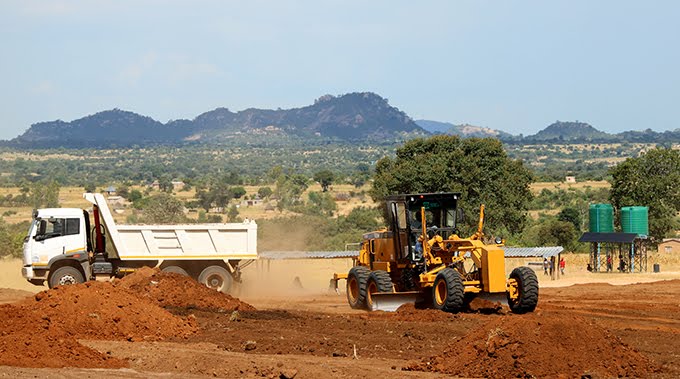TAKUDZWA HILLARY CHIWANZA
ZIMBABWE’s 44th Independence Day commemorations will take place at Murambinda 'B' High School in Buhera District, Manicaland Province, in what the ruling party considers to be in line with its purported ethos of the national struggle for liberation and ongoing development narrative. With only a few days remaining to Independence Day, preparations are gathering momentum and brisk business has been noted.
 |
| Construction works going on at Murambinda B Secondary school where national independence celebrations will take place. [Image: The Sunday Mail] |
All of this however is happening amidst the backdrop of a ravaging El Nino drought that has devastated livelihoods with hunger reigning supreme across the southern African region; and Buhera is one of the worst affected areas in the country as the drought takes a toll on the livelihoods of villagers.
The ruling party – which has been the de facto custodian of Independence Day celebrations by virtue of its being in power despite this being a national day – postulates that the decision hold this year’s commemorations in Buhera is in tandem with the government’s mantra of devolution and decentralisation, under the leadership of President Emmerson Mnangagwa.
The idea, according to the party, is to decentralise Independence festivities and bring them direct to the people of Zimbabwe. This “thoughtful approach”, it is said, brings the “festivities to various provinces and districts goes beyond mere celebration, it serves as a powerful acknowledgement of the diverse and significant contributions made by communities across the nation towards the country’s liberation”.
And at face value, as well as in an idealistic setup, this seems a very plausible line of thinking from the government, which in Zimbabwe is often indistinguishable and inextricable from the ruling party. This line of thinking, which always risks becoming mere empty rhetoric, snugly fits into the ruling party’s neoliberal agenda of ‘development’ and ‘leaving no one behind’. And does well to foster a sense of ‘national pride’ and ‘belonging’. Decentralizing key national events is a laudable argument in such context.
Already, with the preparations gathering pace, Buhera is starting to buzz with activity. Hotels and lodges in Buhera District have already started to note an increase in their profits ahead of the celebrations. Some of the hotels and lodges at the famous growth point are already fully booked ahead of the historic celebrations.
“Preparations to host the Independence Day celebrations are now at an advanced stage, it is true that lodges and hotels are making money and we want to thank President Mnangagwa for bringing the celebrations to Buhera district and interestingly my constituency and this a way of empowering his people,” Zanu PF Buhera North MP Phillip Guyo said.
“Every business is booming and our roads have been upgraded and we have 22 boreholes which have been drilled under the Presidential scheme and this is a major drought relief to my constituency,” he added.
President Mnangagwa will be the guest of honour. The day will light up with the national joy of being a sovereign country freed from colonial rule. The ruling party will own the day, flaunting its wealth and flexing its might. Promises and declarations will be made to the people of Buhera District, and the nation at large, and perhaps promises to alleviate the El Nino drought effects will be delivered.
Yet the image of a grand national spectacle steeped in a rhetoric of nationalism will not do much to help the dire situation in Buhera district, one of the worst affected areas by the drought in Zimbabwe. Recently, the president declared a national state of disaster, extending his begging bowl to all Zimbabweans and the international community—saying Zimbabwe needs an excess of $2billion to address the hunger caused by the drought.
The drought has been serious in Buhera. Food aid is already being distributed, but even this is not enough. Handouts of grain, peas, and cooking oil are being distributed to villagers. “We are grateful, but the food will only be enough for one month,” said Mushaikwa, a villager aged 71 who spoke to Reuters in March. She said all her crops were wilted.
“When you drive around, you will see that many crops have wilted,” said World Food Programme acting country director Christine Mendes in Buhera. 47-year-old villager Mary Takawira said “I do not remember the taste of (corn) anymore. This is going to be a tough year.”
The questions that remain abound. What will happen to the villagers after the Independence Day celebrations are over? Given the ruling party's partisan track record, what guarantees are there that they will not distribute food aid as per ruling party affiliation? Will Independence Day celebrations mean an improved reality for villagers in Buhera amidst this searing drought?
With crops wilting and hunger persisting, the long-term prospects remain grim for the villagers.
As the nation gears up for Independence Day celebrations, the plight of the villagers in Buhera district remains largely overlooked. It is crucial that amidst the festivities, attention and support are directed towards the affected communities.
True decentralization and inclusion would mean ensuring a better future for the people of Buhera, especially in the face of this devastating drought.
















0 Comments